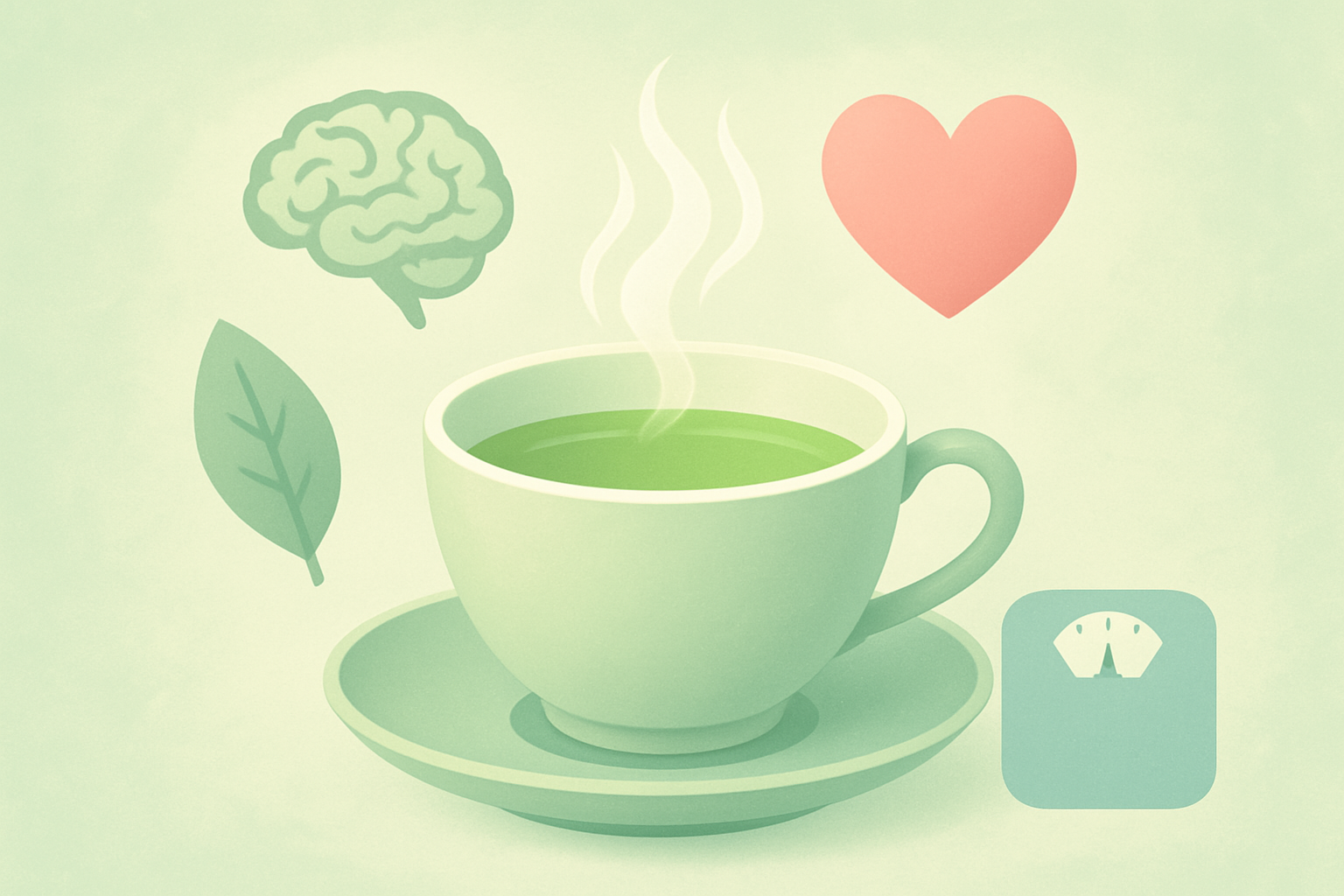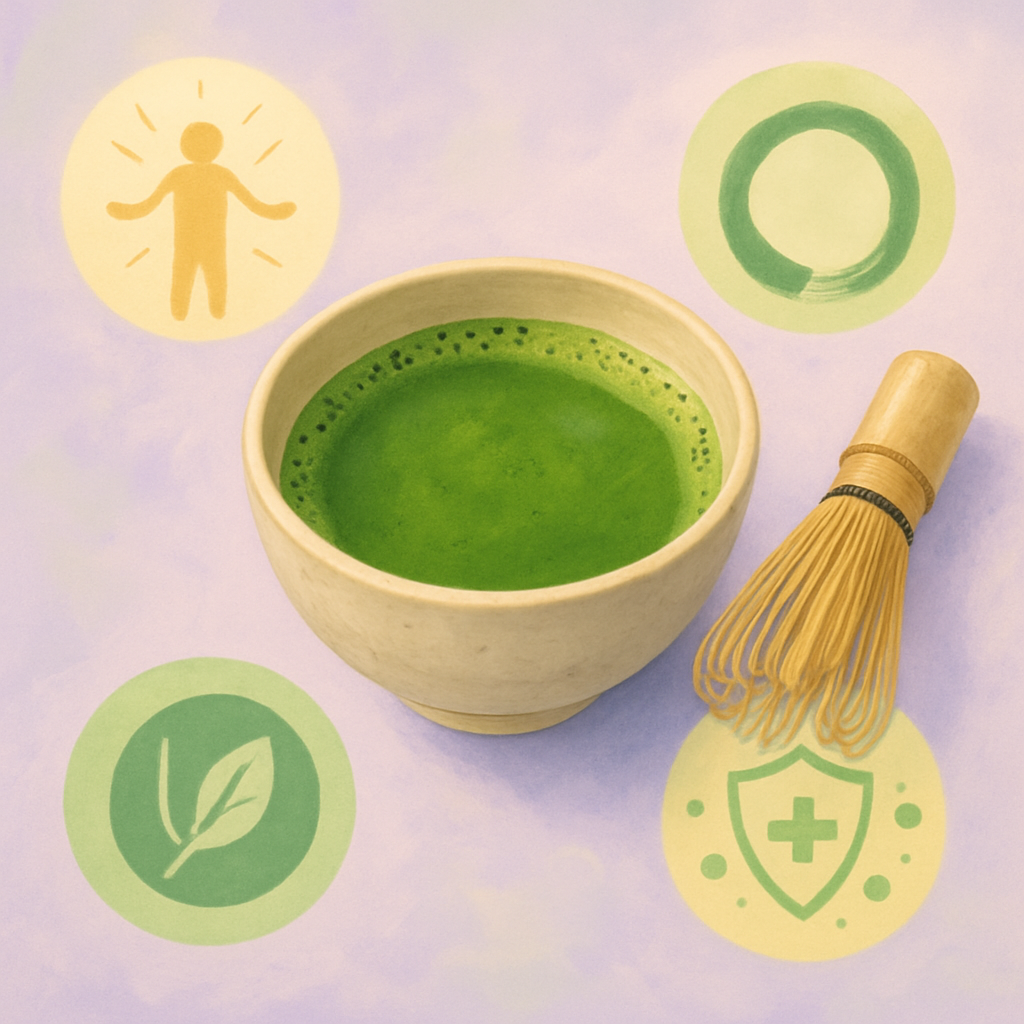Elevate your daily ritual with a wellness tea designed to soothe the soul and nourish the body…
Tea has been cherished across civilizations for thousands of years, not just as a comforting beverage but as a natural remedy promoting health and vitality. From ancient Chinese traditions to modern scientific research, tea continues to reveal its remarkable health-promoting properties, making it one of the most studied natural
beverages in the world. Beyond its soothing warmth and diverse flavors, tea contains powerful bioactive compounds that work synergistically to support overall wellness. As the second most consumed beverage worldwide after water, tea offers an accessible way to incorporate
beneficial plant compounds into our daily routines.
The health benefits of tea stem primarily from its rich content of polyphenols, particularly catechins and flavonoids, which possess potent antioxidant and anti- inflammatory properties. These compounds help combat oxidative stress, support cellular health, and may offer protection against numerous chronic conditions.
What makes tea truly exceptional is its versatility – different varieties offer unique health advantages while catering to diverse taste preferences. Whether you prefer the delicate notes of green tea, the robust character of black tea, or the vibrant earthiness of matcha,
each cup brings its own set of wellness benefits to your daily ritual.
In this comprehensive guide, we’ll explore the science-backed health benefits of tea, with special focus on green tea, matcha, and black tea – three varieties that have demonstrated particularly impressive health-promoting properties through extensive research. We’ll uncover how these natural treasures can support your journey toward optimal health and wellbeing, one cup at a time.

WELLNESS TEA PART 2 : The Remarkable Health Benefits of Green Tea
Sip slowly and breathe deeply — your journey to balance begins with a cup of wellness tea…
Green tea, produced from the leaves of the Camellia sinensis plant without undergoing the oxidation process used to make black and oolong teas, has been revered in traditional Chinese and Japanese medicine for centuries. Modern scientific research continues to validate many of its traditional uses, revealing a treasure trove of health
benefits that make green tea one of nature’s most powerful health and wellness tea.
Rich in Protective Antioxidants
Green tea contains an impressive array of bioactive compounds, with catechins being the most abundant and potent. Epigallocatechin-3-gallate (EGCG), the most studied catechin in green tea, demonstrates remarkable antioxidant activity that helps neutralize harmful free radicals and reduce oxidative stress in the body.
These antioxidants work to protect cells from damage, potentially slowing aging processes at the cellular level. Research published in the National Library of Medicine indicates that green tea’s antioxidant properties may help prevent oxidative stress-related chronic diseases and support overall cellular health.
Cognitive Function and Brain Health
The combination of caffeine and L-theanine in green tea creates a unique synergy that supports brain function. While caffeine is a known stimulant that improves various aspects of brain function including mood, vigilance, and reaction time, L-theanine promotes relaxation without drowsiness. This balanced combination produces a milder, more sustainable form of alertness compared to coffee. Studies suggest that regular green tea consumption may be linked to a 64% lower risk of cognitive decline in middle-aged and older adults, potentially offering protection against neurodegenerative conditions like Alzheimer’s and
Parkinson’s diseases.
Metabolism and Weight Management
Green tea has gained significant attention for its potential role in supporting healthy weight management. The catechins and caffeine in green tea work together to enhance thermogenesis (heat production) and fat oxidation, potentially boosting metabolic rate. A 2022 review found that green tea’s ability to positively influence metabolism is
enhanced when combined with regular exercise. While the National Institutes of Health suggests that green tea’s effect on weight loss may be modest, research indicates that it may particularly help reduce dangerous abdominal fat when consumed regularly as part of a healthy lifestyle.
Cancer Prevention Properties
Laboratory and epidemiological studies suggest that green tea’s potent antioxidant and anti-inflammatory properties may offer protection against certain types of cancer. The polyphenols in green tea, particularly EGCG, have been shown to inhibit tumor cell
proliferation and induce cancer cell death in test tube studies.
Population-based studies have linked green tea consumption with reduced risks of several cancers, including breast, prostate, colorectal, and lung cancers. While research continues to evolve in this area, the potential cancer-protective effects of green tea represent one of its most promising health benefits.
Cardiovascular Health Support
Green tea consumption has been associated with improved cardiovascular health markers in numerous studies. Research suggests that regular green tea intake may help:
Lower total and LDL (bad) cholesterol levels
Increase HDL (good) cholesterol
Reduce blood pressure
Improve arterial function
Decrease inflammation
A 2022 review found that regularly drinking green tea could lower many risk factors for heart disease. These benefits are attributed to green tea’s ability to improve endothelial function, reduce inflammation, and protect LDL particles from oxidation, key factors in preventing heart disease.
Blood Sugar Regulation
Green tea may offer benefits for insulin sensitivity and glucose metabolism, making it potentially beneficial for those at risk of or managing type 2 diabetes. Studies suggest that green tea catechins may help:
Reduce fasting blood sugar levels
Improve insulin sensitivity
Lower hemoglobin A1c (a marker of long-term blood sugar control)
A 2021 study on Chinese adults suggested a 10% lower chance of death from type 2
diabetes for those who drink green tea daily, though more research is needed to establish definitive conclusions.
Oral Health Benefits
The catechins in green tea have antimicrobial properties that may help inhibit the growth of bacteria associated with dental caries and periodontal disease. Research indicates that green tea consumption is associated with:
Reduced bacterial growth in the mouth
Decreased risk of tooth decay
Improved gum health
Fresher breath due to antibacterial effects
These benefits make green tea not just good for your body, but for your smile as well.

WELLNESS TEA PART 3 : Longevity and Quality of Life
Perhaps most compelling is research suggesting that regular green tea consumption may contribute to increased longevity. Studies from Japan found that those who drank five or more cups per day had a lower chance of death from all causes compared to those drinking one cup or less.
A 2021 study found that drinking seven cups of green tea daily decreased the risk of death from all causes by 62%, even among people who have had heart attacks, suggesting green tea’s potential role in not just extending life but improving quality of life as well. For optimal health benefits, research suggests consuming 3-5 cups (24-40 ounces) of green tea daily, though benefits have been observed even at lower consumption levels. As with any dietary change, it’s important to consider individual factors such as caffeine sensitivity and potential medication interactions.
WELLNESS TEA PART 4 : The Exceptional Health Benefits of Matcha Tea
Awaken your senses and center your soul with matcha wellness tea — the ritual your body will thank you for…
Matcha, a special form of green tea, has been central to traditional Japanese tea ceremonies for centuries and has recently gained worldwide popularity for its distinctive flavor profile and impressive health benefits. Unlike regular green tea where the leaves are steeped and discarded, matcha involves consuming the entire tea leaf in powdered form, resulting in a more concentrated source of nutrients and antioxidants.
A Nutritional Powerhouse
Matcha stands out among teas for its exceptional nutritional profile. When you drink matcha, you consume the entire leaf, providing you with a more potent source of vitamins, minerals, amino acids, and antioxidants than regular steeped green tea. A single cup of matcha is estimated to provide the nutritional equivalent of 10 cups of regular green tea, making it one of the most efficient ways to obtain tea’s health
benefits.
Unparalleled Antioxidant Content
Matcha contains remarkably high levels of catechins, particularly epigallocatechin gallate (EGCG), which is recognized for its powerful antioxidant properties. These antioxidants help neutralize harmful free radicals, reducing oxidative stress and cellular damage throughout the body. The ORAC (Oxygen Radical Absorbance Capacity) value, which measures antioxidant capacity, is significantly higher in matcha than in other superfoods. This exceptional antioxidant content contributes to matcha’s potential to support overall health and protect against various chronic diseases.
Enhanced Cognitive Function
Matcha contains a unique combination of caffeine and L-theanine, an amino acid that promotes relaxation without drowsiness. This special pairing creates a state of calm alertness, often described as “mindful energy” a sustained, focused state without the jitters or crash associated with other caffeinated beverages. Research published in the National Library of Medicine suggests that this combination may enhance brain function, improving attention, reaction time, and memory while
reducing anxiety. The traditional use of matcha by Zen Buddhist monks to remain alert yet calm during long hours of meditation reflects these cognitive benefits.
Metabolism and Weight Management Support
The concentrated catechins in matcha, particularly EGCG, have been shown to boost metabolism and increase fat oxidation. Studies suggest that consuming matcha before exercise may enhance fat burning during physical activity. Additionally, matcha may help regulate blood sugar levels and reduce appetite, supporting healthy weight management when incorporated into a balanced diet and active lifestyle. The thermogenic properties of matcha—its ability to increase the body’s
rate of burning calories—make it a popular addition to many weight management programs.
Detoxification Properties
Matcha is particularly rich in chlorophyll, the compound that gives plants their green color and helps them convert sunlight into energy. Chlorophyll is known for its detoxifying properties, helping to eliminate heavy metals and chemical toxins from the body.
The traditional cultivation method for matcha involves shading the tea plants for several weeks before harvest, which increases chlorophyll production and gives matcha its vibrant green color and enhanced detoxifying properties.
Heart Health Benefits
Regular consumption of matcha may contribute to cardiovascular health through multiple mechanisms. The catechins in matcha have been shown to help:
Lower LDL (bad) cholesterol while increasing HDL (good) cholesterol
Reduce blood pressure
Improve arterial function and blood flow
Decrease inflammation in blood vessels
These combined effects may significantly reduce the risk of heart disease and stroke when matcha is consumed as part of a heart-healthy lifestyle.
Immune System Support
Matcha contains substantial amounts of epigallocatechin gallate (EGCG), L-theanine, and vitamin C, all of which support immune function. These compounds help strengthen the body’s defense mechanisms against pathogens and may reduce susceptibility to infections. The catechins in matcha also exhibit antimicrobial properties against various bacteria and viruses, potentially offering protection against common illnesses and supporting overall immune resilience.
Skin Health Enhancement
The powerful antioxidants in matcha may benefit skin health by protecting against UV damage and reducing signs of aging. EGCG has been shown to reactivate dying skin cells and may help with conditions like rosacea, acne, and inflammatory skin issues. When consumed regularly, matcha’s anti-inflammatory properties may help reduce skin
redness and irritation, while its detoxifying effects can contribute to a clearer, more radiant complexion.
Stress Reduction and Mood Enhancement
L-theanine, abundant in matcha, promotes the production of alpha waves in the brain, which are associated with relaxation and a state of wakeful calm. This compound also influences the production of dopamine and serotonin, neurotransmitters that affect mood, sleep, emotion, and stress responses. Regular matcha consumption may help reduce stress levels, improve mood, and promote a sense of well-being without the sedative effects found in many anti-anxiety treatments.
Incorporating Matcha Into Your Wellness Routine
For optimal health benefits, quality matters when selecting matcha. Ceremonial grade matcha, which is vibrant green and smooth in texture, offers the highest concentration of nutrients and the most pleasant taste for drinking. Most research suggests that 1-2 cups of matcha daily is sufficient to experience its health benefits.
Matcha can be prepared traditionally with hot (not boiling) water and whisked until frothy, or incorporated into smoothies, lattes, baked goods, and other recipes for a nutritional boost. (See our recipes)
As with any concentrated source of bioactive compounds, it’s advisable to introduce matcha gradually into your diet and consult with a healthcare provider if you have existing health conditions or are taking medications that might interact with its components.

Key Takeaways
The research is clear: regular tea consumption can be a valuable component of a wellness-focused lifestyle. Here are the key insights from our exploration:
Antioxidant Protection: All tea varieties provide powerful antioxidants that help combat oxidative stress and cellular damage, with green tea and matcha offering particularly high concentrations of catechins like EGCG.
Heart Health Support: Black tea shows impressive benefits for cardiovascular health, with studies demonstrating reduced risk of heart disease, stroke, and overall mortality among regular tea drinkers.
Cognitive Enhancement: The unique combination of caffeine and L-theanine found in tea, especially green tea and matcha, supports brain function while promoting a state of calm alertness without the jitters associated with other caffeinated beverages.
Metabolic Benefits: Green tea and matcha may support healthy metabolism and weight management through thermogenic effects and improved fat oxidation, particularly when combined with regular exercise.
Immune System Support: The various bioactive compounds in tea help strengthen immune function and provide antimicrobial properties that may help protect against common illnesses.
Incorporating Tea Into Your Wellness Routine
To maximize the health benefits of tea, consider these practical recommendations:
Consistency is Key: Research suggests that regular consumption of 2-5 cups daily provides the most significant health benefits.
Quality Matters: When possible, choose loose leaf teas or high-quality tea bags to ensure maximum concentration of beneficial compounds.
Mindful Preparation: For optimal extraction of beneficial compounds, brew green and white teas with water below boiling (around 175°F/80°C), while black teas can withstand boiling water.
Minimal Processing: Less processed teas (white, green) generally retain more of their natural compounds, though all tea varieties offer health benefits.
Enjoyment Factor: The best tea for your health is one you enjoy drinking regularly, so explore different varieties to find your perfect cup.
A Balanced Approach
While the health benefits of tea are impressive, it’s important to view tea as part of a holistic approach to wellness rather than a miracle cure. Tea works best as a complement to other healthy lifestyle choices, including a balanced diet, regular physical activity, adequate sleep, and stress management.
By incorporating tea into your daily routine, you’re not just enjoying a delicious beverage you are participating in a centuries-old tradition that continues to reveal its remarkable health-promoting properties through modern scientific research.
Whether you’re sipping a robust black tea with breakfast, enjoying a mindful matcha ceremony in the afternoon, or relaxing with a delicate green tea in the evening, each cup brings you a step closer to your wellness goals while providing a moment of comfort and reflection in our busy world.
References
1.Khan, N., & Mukhtar, H. (2013). Tea and Health: Studies in Humans. 2.Current Pharmaceutical Design, 19(34), 6141-6147.
3.National Library of Medicine. (2020). Health Benefits of Tea. Herbal 4. Medicine: Biomolecular and Clinical Aspects. Penn Medicine. (2022). 5. The Hidden Health Benefits of Tea. University of Pennsylvania Health System.
6.National Cancer Institute. (2022). Study suggests health benefits from black tea. https://www.cancer.gov/news-events/press-releases/2022/health-benefits-black-tea
7.National Institutes of Health.
Healthline. (2025). 10 Evidence-Based Benefits of Green Tea. Healthline Media. https://www.healthline.com/nutrition/top-10-evidence-based-health-benefits-of-green-tea
8.UCLA Health. (2022). 6 health benefits of drinking black tea. University of California Los Angeles. https://www.uclahealth.org/news/article/6-health-benefits-of-drinking-black-tea
9.Harvard Health. (2021). The health benefits of 3 herbal teas. Harvard Medical School. https://www.health.harvard.edu/nutrition/the-health-benefits-of-3-herbal-teas

